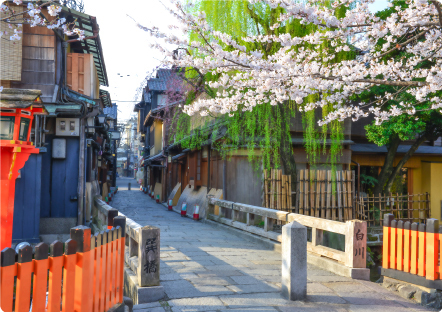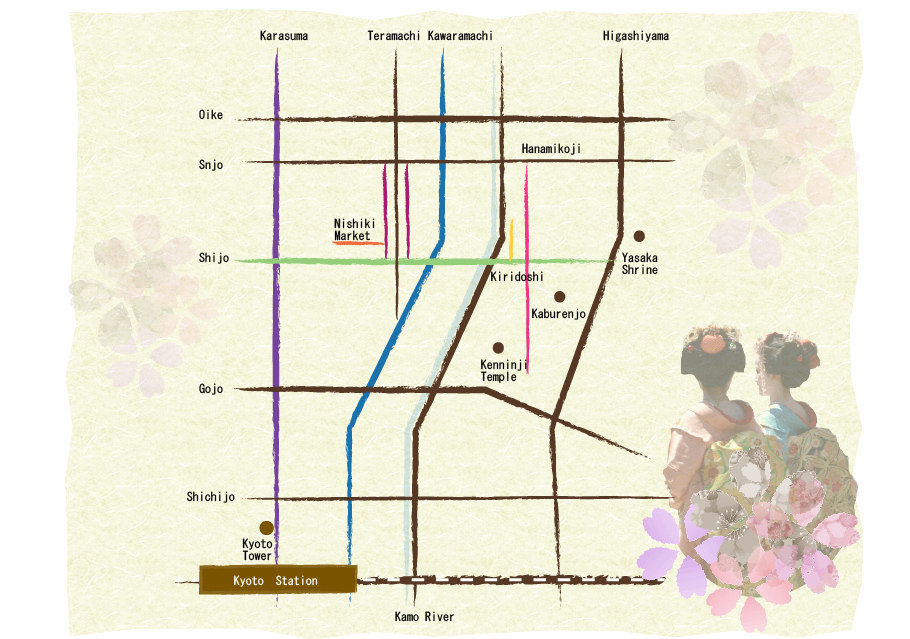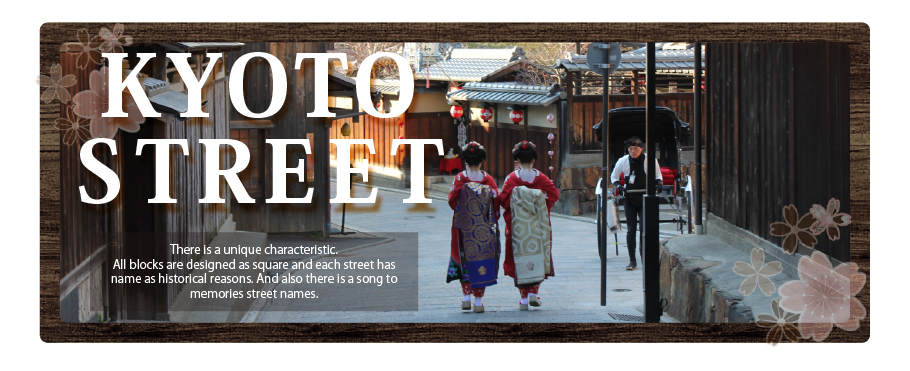 During Heian period main streets and others were established.
In 794, it was planned the city as the capital using a model of continental city.
During Heian period main streets and others were established.
In 794, it was planned the city as the capital using a model of continental city.
Put the imperial court to the north area and pulled down a main street to the south.
Then each East and West area divided into “Oji” which has 24-50 meters street and “koji” which has 12 meters. The actual street as a chessboard made in these period (1200 years ago).
There was no name for each streets and it was called with commonly known by.
Little by little the name become as formal address.
For example an area where delivery service shops were calls based on that name.

During the night, it is easier to recognize that Kyoto Streets are straight and blocks are squared.
From Kyoto station and Kyoto tower is the best points to enjoy the view.


The street lies from the North to the South around Shijo Street
(East to West Street).
The north sides of Hanamikoji, there are many bars and clubs.
On the other side which is the South, there are traditional sight and tea houses which keep true Kyoto style even now
(actually, it modernized ground and other details).

Pontocho (it could be Saisekidori) leis down besides Kamo river. The street has only 500 meters short but the area is well known as the origin Maiko (Geisha) playing and other traditional small restaurants, sight, traditional bars, etc which is really famous and popular for tourist and local people. And during the summer season, “Yuka” will appear. Yuka is a seasonal floor faces to the fiver and feel the season with service. This custom can be look back to Edo period (1603-1868). In these area has chance to meet a real Maiko in the evening.

Where you can feel Kyoto every body says Gion area. The street sights take back you to ancient Kyoto. Tatsumibashi Bridge is famous spot for films and drama, where visit many tourists.
Shirakawa-minamidori leis beside Shirakawa river where has elegant and traditional old sight of Kyoto.
The road is famous of Cherry blossom during the spring season and light up during night time. When goes there please pass through Kiritoshi. In these area has chance to meet a real Maiko in the evening, too.

Shijodori is the street for shopping, business, and tourism which lies about 7 kilo meters from the west to the east.
It says the origin of Kabuki and there is the oldest Kabuki Theater on the east of Kamo River.
Kawaramachi Street is the street lies from the north to the south.
The both streets are one of the main street in Kyoto city.

It says about 400 years ago the market street was established. During Edo period, the market was developed as seafood whole seller area. Actually Nishiki market has about 130 shops lies 400 meters from the east to the west. Mainly, the shops sell fresh and processed food materials something indispensable for Kyoto cuisine. It works as a center of food shopping street for restaurants and local people.

The street was developed recently, during Taisho period (1912-1926) to Showa period (1926-1989) between Shijo and Sanjo Streets there are two streets from the north to the south next to each other.
The both of the streets have variable range of shops more than 150 shops including Movie Theater.
Nishiki-tenmangu is in there, too.

It says about 400 years ago the market street was established. During Edo period, the market was developed as seafood whole seller area. Actually Nishiki market has about 130 shops lies 400 meters from the east to the west.
Mainly, the shops sell fresh and processed food materials something indispensable for Kyoto cuisine. It works as a center of food shopping street for restaurants and local people.
To remember all streets kids sing a song to remember the street name.

Maru Take Ebisu Ni Oshi Oike Ane San Rokkaku
Tako Nishiki Shi Aya Bu Ttaka Matsu Man Gojo
Sekida Charachara Uonotana Rokujo Santetsutorisugi
Shichi Chou Koereba HachiKujo Jujo Tojide Todomesasu











